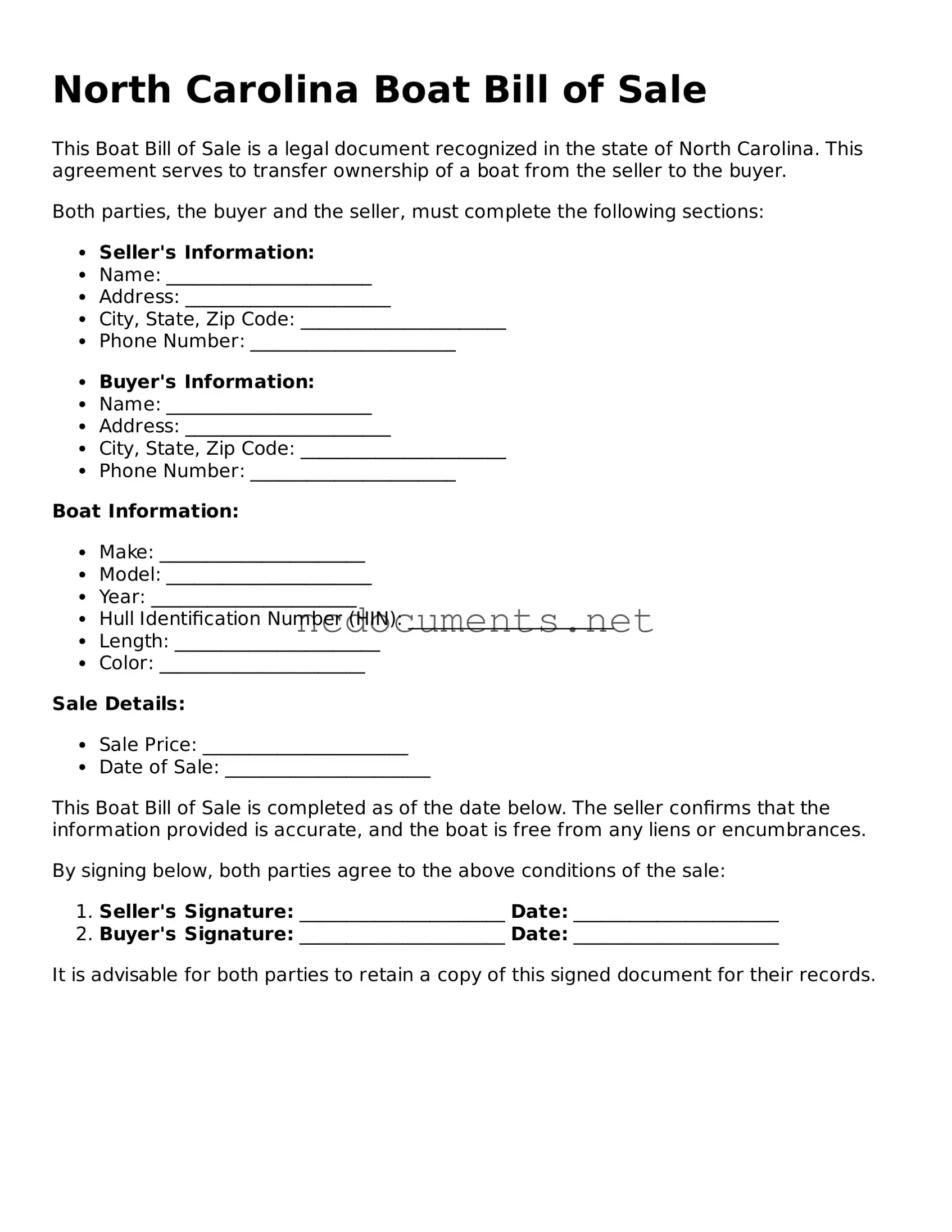The North Carolina Boat Bill of Sale form is similar to the Vehicle Bill of Sale, which is used for the transfer of ownership of cars and trucks. Like the Boat Bill of Sale, the Vehicle Bill of Sale includes essential details such as the buyer's and seller's information, the vehicle's identification number (VIN), and the sale price. Both documents serve as proof of ownership and help protect both parties in the transaction. They also typically require signatures from both the buyer and seller to be valid.
Another document that resembles the Boat Bill of Sale is the Motorcycle Bill of Sale. This form is specifically designed for the sale of motorcycles, but it shares many characteristics with the Boat Bill of Sale. Both documents contain information about the parties involved, a description of the item being sold, and the sale price. They also serve as legal proof of the transaction, which can be important for registration and title transfer purposes.
The ATV Bill of Sale is also similar to the Boat Bill of Sale. This document is used when selling all-terrain vehicles. Like the Boat Bill of Sale, it requires details about the buyer and seller, as well as a description of the ATV, including its identification number. Both documents help ensure a smooth transfer of ownership and can be used to resolve any disputes that may arise after the sale.
Similar to other ownership transfer documents, the Puppy Bill of Sale serves a crucial role in ensuring that the purchase and transfer of dogs are conducted legally and transparently, outlining essential information about the animal and protecting the interests of both the buyer and seller.
Additionally, the Snowmobile Bill of Sale serves a similar purpose. It documents the sale of a snowmobile and includes information about the buyer, seller, and the snowmobile itself. As with the Boat Bill of Sale, this document provides legal protection for both parties and is often required for registration with state authorities.
The Trailer Bill of Sale is another document that shares similarities with the Boat Bill of Sale. This form is used when selling a trailer, whether it's for a boat, camper, or other purposes. It includes the necessary details about the buyer and seller, as well as a description of the trailer. Both documents serve to establish ownership and facilitate the transfer process, ensuring that both parties are protected.
The RV Bill of Sale is comparable as well. This document is specifically for the sale of recreational vehicles. Similar to the Boat Bill of Sale, it includes information about the buyer and seller, a detailed description of the RV, and the sale price. Both forms serve as a record of the transaction, which can be crucial for registration and future ownership verification.
The Firearm Bill of Sale also bears resemblance to the Boat Bill of Sale. This document is used to record the sale of firearms and includes details about the buyer, seller, and the firearm itself. Both documents are important for legal compliance and provide a clear record of ownership transfer, which can help prevent legal issues down the line.
The Equipment Bill of Sale is another similar document. This form is often used for the sale of heavy machinery or other equipment. Like the Boat Bill of Sale, it requires information about the buyer and seller, as well as a description of the equipment being sold. Both documents help protect the interests of both parties and ensure that the sale is properly documented.
Lastly, the Pet Bill of Sale can be compared to the Boat Bill of Sale. This document is used when transferring ownership of pets. It includes details about the buyer, seller, and the pet itself. Both documents serve as a formal record of the transaction and can help clarify ownership in case of disputes.

